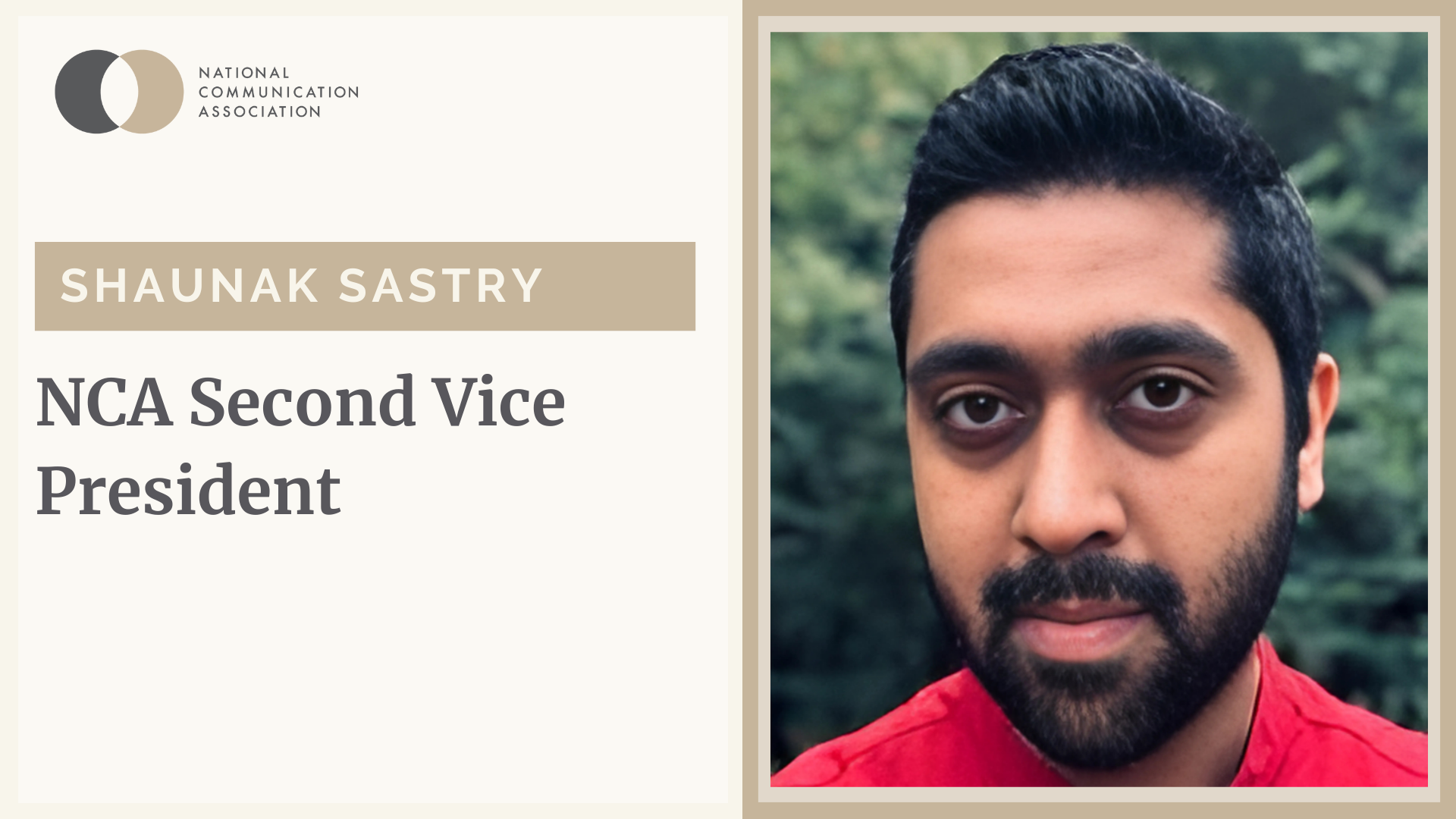Shaunak Sastry Elected NCA’s New Second Vice President

Dr. Shaunak Sastry, Ph.D. is Professor of Communication in the School of Communication, Film, & Media Studies at the University of Cincinnati. He is also Provostal Fellow, leading a university-wide effort to align community-engaged research at the University of Cincinnati. Dr. Sastry is the 2nd Vice-President of the National Communication Association. His award-winning health communication research has been funded by the National Institutes of Health, and he currently is Co-Principal Investigator and co-lead of the Community Engagement Core of the Cincinnati Center for Climate Change and Health, which is funded by a $4 million NIH P20 award. He has served as Director of The Cincinnati Project, a center for community-engaged research in the College of Arts & Sciences at UC. His research and teaching interests are in the areas of critical health communication, globalization, and infectious disease politics. His research has been published in leading international peer-reviewed journals like Human Communication Research, Communication Theory, Communication Monographs, Health Communication, Journal of Health Communication, Culture, Health & Sexuality, Frontiers in Communication, and Journal of International and Intercultural Communication, in addition to several book chapters and more than 50 paper presentations at national and international conferences. He is past senior editor of the journal Health Communication and sits on the editorial board of several leading academic journals. Dr. Sastry teaches courses in health communication, globalization, and research methods at the undergraduate and graduate level at the University of Cincinnati
From the Vision Statement of Dr. Sastry
My goals can be encapsulated by three keywords: demystification, democratization, and professionalization:
- Demystification: NCA’s heterogeneous membership, together with the particularities of our governance structure, internal functioning, and cultural scripts can work to make NCA daunting and even alienating to members. One of my primary goals is to demystify NCA in ways that foster belonging, ownership, and accountability. By this I mean that it is the onus of NCA leaders to offer context, rationale, process, and texture to decisions that are made on behalf of the members. In practice, demystification can look like, but is not limited to:
- Ensuring members have a detailed and regular access to NCA budgets and finances.
- Establishing criteria and metrics for nominated leadership positions, awards, and honors.
- Identifying pipelines for members to participate in interest group, caucus, and NCA decision-making.
- Establishing meaningful evaluation criteria to existing strategic goals, plans, and aspirations.
- Expending resources on crystallizing and standardizing NCA policies and bylaws.
- Democratization: NCA interest group leaders, LA members, and the composition of the EC increasingly resemble the diversity of our membership, and this transformation was the result of collective organizing and advocacy by members. However, as social movement scholars warn us, institutions are by their very nature resistant to transformation, and that representational politics, while acutely necessary, may not be sufficient to ensuring long-term change changes. Ergo, policies of democratization, which may include, but are not limited to:
- Enabling and empowering the Legislative Assembly to act more regularly as a liaison between membership, interest groups and the association leadership.
- Simplify and streamline the process for members to propose resolutions, policy statements, white papers on important issues for educators and researchers.
- Expanding and evaluating NCA’s role in meeting its IDEA strategic plan goals.
- Recognizing NCA’s role as advocacy organization for a wider range of stakeholders than currently represented.
- Expanding on NCA’s role in creating public and community-engaged scholarship in Communication across the convention, NCA journals, and programs.
- Professionalization: I see an urgent need for further professionalization of the association and its offerings. As such, it is imperative that we clearly define how NCA programs, conventions, and resources provide tangible benefits to its members. Recent surveys show that for most members, our convention is synonymous with the association. This is intuitive, but also opens opportunities to expand the professional benefits of an NCA membership. Professionalization for me refers to ideas like:
- Expanding the culture of research professionalization at NCA (e.g. the Research Cultivation Grant Program) and similar program offerings for educators, practitioners and students.
- Building connections from NCA to grant-offering foundations and institutions that see the value of Communication perspectives, and advocacy for those that don’t.
- Medium-term vision thinking and stewardship of our journals to navigate AI challenges, open-data and open science opportunities, editorial and reviewer fatigue, and entrenched equity and access issues.
- Innovating the format and scope of future conventions, building on ongoing work in this area.
- Exploring the role of micro-credentialing and professional development opportunities for non-academic audiences at NCA.
Elected Leadership Positions
Legislative Assembly
Elected to a three-year term beginning in January 2025.
- Debbie S. Dougherty, University of Missouri
- Danielle Hodge, University of Colorado, Boulder
- Rebecca Leach, University of Arkansas
Leadership Development Committee
Elected to a two-year term beginning in January 2025.
- Sarah Amira de la Garza, Arizona State Unviersity
- Lisa Hanasono, Bowling Green State University
Nominating Committee
Elected to a one-year term beginning in January 2025.
- Jayne Cubbage, Bowie State University
- Nicholas Lacy, Purdue University
- Qingwen Dong, University of the Pacific


